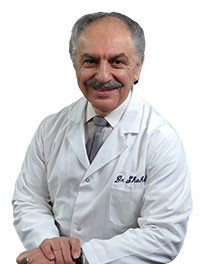Gallbladder Diet in Midland Park, NJ

The gallbladder is a small, pear-shaped organ located on the right side of your abdomen, sitting beneath and connected to the liver. The liver produces bile, and shunts excess bile to the gallbladder for storage. The gallbladder's job is to store this excess bile and dispense it as needed to break down fats. If your body is not digesting fats properly, it is likely something is slowing or blocking the flow of bile from the gallbladder, leading to abdominal pain, digestion difficulties and additional health concerns.
More than 25 million U.S. adults experience gallbladder problems, ranging from gallstones —hardened deposits which form in the gallbladder when bile contains too much cholesterol—to inflammation (cholecystitis) and gallbladder disease.
Your dietary choices play an important role in maintaining gallbladder health. A special gallbladder diet can often help heal a sick gallbladder and prevent surgical removal. Diet can also be essential if your gallbladder has already been removed in order to minimize post-surgical complications and general discomfort.
To schedule a consultation with a healthcare provider in Midland Park that can devise a gallbladder diet to optimize your health, call (201) 806-6099 or contact Dr. M.T. Shahab online.
Gallbladder Diet & Lifestyle Recommendations
Your risk of gallbladder complications increases if you are overweight or obese, losing a large amount of weight in a short time period, suffering from diabetes or Crohn's disease , eating a diet high in fat and cholesterol, or taking birth control pills or drugs to lower cholesterol.
To prevent gallbladder issues from arising, or correcting these issues before surgery is needed, it is important to consider the following dietary and lifestyle adjustments:
- If you are overweight, lose weight but do it gradually
- Seek treatment to manage your diabetes or Crohn’s disease
- Eat a lower fat diet that includes lean protein, vegetables, fruits, whole grains and healthy fats
- Eat a diet designed to target healthy cholesterol levels
- Eat high fiber foods
- Drink plenty of water
- Try herbs and supplements to support gallbladder health, including digestive enzymes, ox bile, milk thistle, dandelion root, turmeric and rosemary
Gallbladder diet plans can be devised with your healthcare provider which accommodate the above recommendations and take into consideration potential food allergens and lifestyle accommodations. Your healthcare provider will also recommend foods to avoid with gallbladder problems, including:
- Hydrogenated oils
- Sugar
- Dairy
- Fried foods
- Processed foods
- Simple carbohydrates
- High-fat foods
Diet After Gallbladder Removal
Humans can live without a gallbladder, and while its removal may be necessary for your health overall, there can be long-term ramifications. When the gallbladder is removed, the liver dumps bile into the intestines; but without the gallbladder's precision, fats may not be digested properly, and fat-soluble vitamins may not be assimilated. These nutritional deficiencies can cause additional issues like bloating, constipation, diarrhea, nausea, poor absorption of fat-soluble vitamins, vitamin D deficiency, poor night vision and other symptoms of vitamin A deficiency and soft tissue calcification.
Do you need to change your diet after removing your gallbladder? Absolutely.
All of the dietary recommendations listed above are advisable, with the caveat that you may have difficulty tolerating high-fat foods. It is essential, however, that you eat fats with your food because fat-soluble vitamins in your food require fat to be absorbed by your body. Taking bile or digestive enzyme supplements with each meal is an option. Using MCT oil or caprylic acid (derived from coconut oil)—which has short-chain fatty acids that bypass the liver and do not require bile for digestion—may be helpful as well. Simple coconut oil will be easier for your body to digest than other fats, so you may want to cook vegetables and make salad dressing with unrefined coconut oil in lieu of other oils.
Changing your diet can mitigate the potential issues associated with gallbladder removal. However, there is no set diet required of you; your long-term diet will depend on you and what your body tolerates. Eating smaller meal sizes more often throughout the day can help alleviate discomfort by reducing the amount of fat your body must break down at once. Adding foods gradually back into the diet after gallbladder removal, as well as keeping a journal to record the impact these foods have on your system, can help you devise a long-term diet that works best for you.
Use Your Diet & Lifestyle to Your Advantage
Your diet is a powerful way to influence your gallbladder health and overall wellness. Together with regular physical activity and the use of dietary supplements as necessary, you can prevent gallbladder concerns from becoming a larger issue that requires surgical intervention.
If you are facing gallbladder removal, have already had your gallbladder taken, or just want to make sure your gallbladder stays healthy, request more information about gallbladder health and gallbladder diet options today from a qualified healthcare provider. Call (201) 806-6099 or contact Dr. M.T. Shahab online.
Medwell Orthopedics & Functional Medicine for Men & Women
Address
33 Central AveMidland Park, NJ 07432
(201) 806-6099
www.BergenCountyDoctors.com
Hours
Mon:
8:00 am - 8:00 pm
Tue:
2:00 pm - 7:00 pm
Wed:
8:00 am - 6:30 pm
Thu:
8:00 am - 1:00 pm
Fri:
8:00 am - 6:30 pm
Sat:
9:00 am - 1:00 pm
Sun:
By Appointment Only


